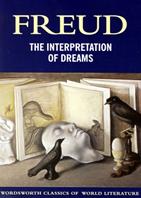
Early in the twentieth century, two famous scientists developed different ideas about dreams. Austrian psychiatrist Sigmund Freud published a book called The Interpretation of Dreams in 1900. Freud believed people often dream about things they want but cannot have. These dreams are often linked to sex and aggression.
For Freud, dreams were full of hidden meaning. He tried to understand dreams as a way to understand people and why they acted or thought in certain ways. Freud believed that every thought

and every action started deep in our brains. He thought dreams could be an important way to understand what is happening in our brains.
Freud told people what their dreams meant as a way of helping them solve problems or understand their worries. For example, Freud said when people dream of flying or swinging, they want to be free of their childhood. When a person dreams that a brother or sister or parent has died, the dreamer is really hiding feelings of hatred for that person. Or a desire to have what the other person has.
Swiss psychiatrist Carl Jung worked closely with Freud for several years. But he developed very different ideas about dreams. Jung believed dreams could help people grow and understand themselves. He believed dreams provide solutions to problems we face when we are awake.
He also believed dreams tell us something about ourselves and our relations with other people. He did not believe dreams hide our feelings about sex or aggression.
68.According to the passage, Sigmund Freud held that ________________.
A.dreams can help understand people’s action
B.when people dream that they fly in the sky, they are actually desire something
C.if a person dreams that a brother has died, he or she must hates the brother
D.if people want to better understand themselves, they will dream
69. What is Carl Jung’s opinion of dreams?
A. His dreams are different from those of Sigmund Freud.
B. Whenever we face problems, we can find solutions to them in our dreams.
C. Dreams help understand people’s thoughts.
D. Dreams at times show our relations with other people.
70. From the passage, we learn that ______________________.
A. The Interpretation of Dreams was written by Freud as well as Jung
B. Freud helped people solve problems by telling what their dreams meant
C. Freud and Jung always worked together
D. both of them told us clearly why we dream
The author seems to be ___________.
A. in favor of Freud B. in favor of Jung C. objective D. critical